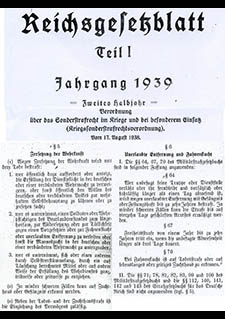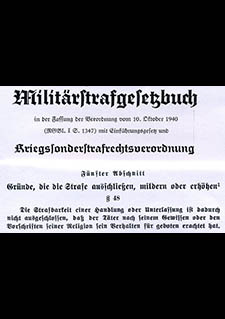Conscientious Objection
In a state that had cast active military service as a bounden duty to Volk and Fatherland, conscientious objection was an eminent act of resistance. Such objection could be expressed by deserting or generally refusing to serve with a weapon.
Section 6 der Special Wartime Criminal Code originally provided the death sentence or life or time in prison for unauthorized absence from a troop or post. On April 14, 1940, Hitler personally ordered the imposition of the death sentence for desertion.
Altogether, Wehrmacht courts handed down approximately 35,000 judgments for desertion, 22,000 of which were death sentences, of which approximately 15,000 were carried out. The other defendants were sentenced to prison– they often had to serve their prison sentence in so-called “probation units”, which were order on especially dangerous missions.
Germany generally had no provisions for an option of conscientious objection. Section 48 of the Military Penal Code of 1872, which basically continued to exist in the “Third Reich”, had expressly decreed that the punishability of an action or omission is also not obviated when the perpetrator deems his conduct justified according to his conscience or the tenets of his religion. Concretely, this meant that religious reasons were not grounds for conscientious objection. Objectors were thus subject to section 5 of the Special Wartime Criminal Code according to which undermining military preparedness was to be punished by death.
The largest group to of conscientious objectors on religious grounds by far came from the Jehovah's Witnesses, which had been banned nationwide on April 1, 1935. In the first nine months of the war, the Reich court martial handed down 63 death sentences on Jehovah's Witnesses alone; in the first year of the war, 123 Jehovah's Witnesses were executed for “undermining military preparedness”.
This harsh approach was justified with reference to the “necessity of war”. A total of well over 300 Jehovah's Witnesses were executed during the Nazi era for voicing their rejection of the Nazi state in different ways.
Seven Seventh-day Adventists also met with death for refusing to swear the oath of allegiance.
There were hardly any conscientious objectors in the two major churches because of their traditions, which had always also been acquainted with religious approval of a (defensive) war. Catholics could not expect support in this issue from their episcopate, nor could Protestants from their church – not even the Confessing Church. The two churches called unanimously for to obedience and sacrifice for Führer and Fatherland when war broke out.
Seven Catholics are known to have conscientiously objected and have been punished by death: Franz Jägerstetter, an Austrian, Franz Reinisch, a priest from the Pallottines, Michael Lerpscher, zugehörenden the Umfeld of the Society of Christ the King, and Josef Ruf. Alfred Andreas Heiss, Ernst Volkmann and Richard Reitsamer from Upper Franconia also deserve mention. One Catholic and two Quaker conscientious objectors survived.
Source / title
- Reichsgesetzblatt 1939, p. 1456; Militärstrafgesetzbuch. In der Fassung der Verordnung vom 10. Oktober 1940. Erläutert von Martin Rittau. Berlin 1943.


